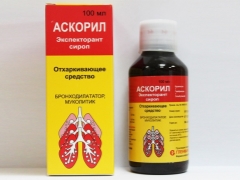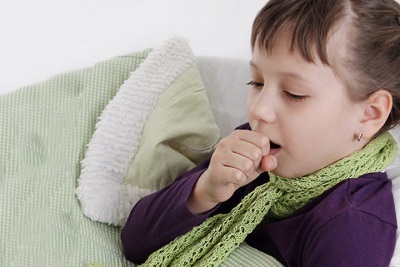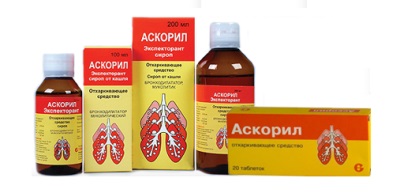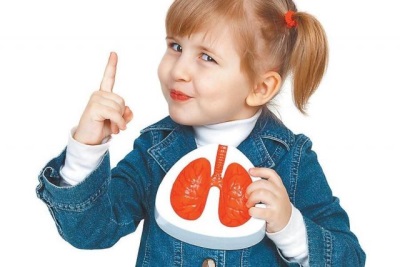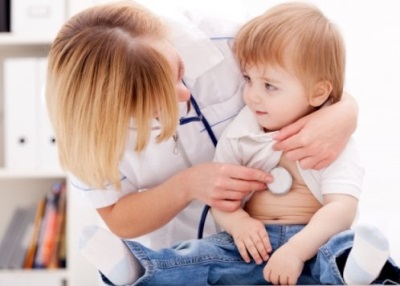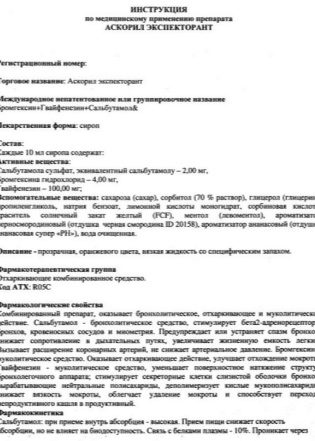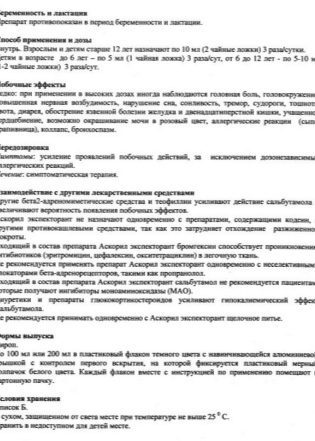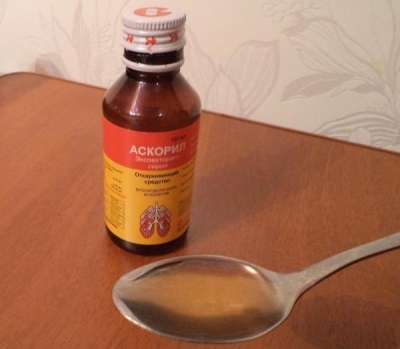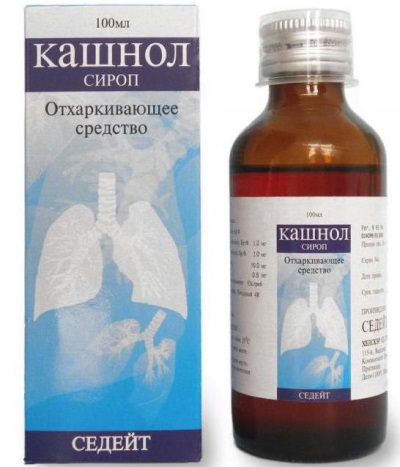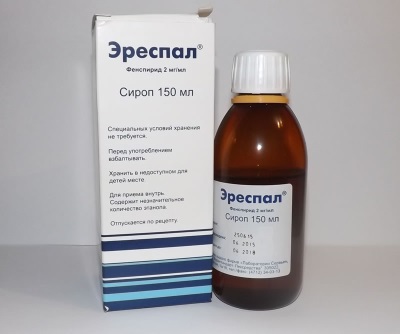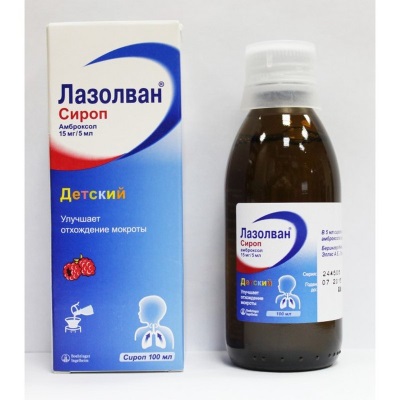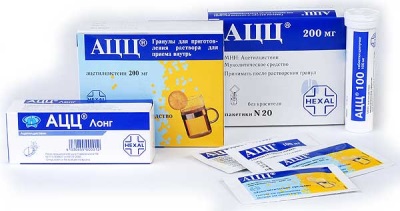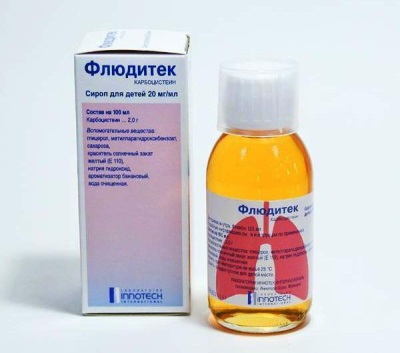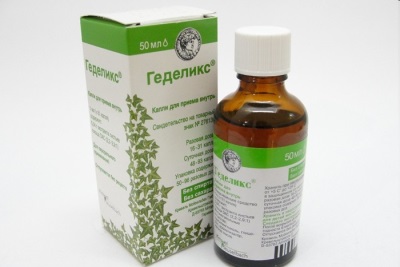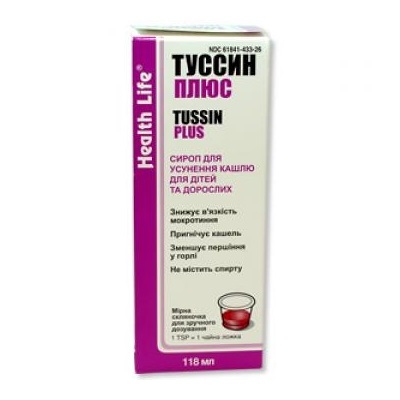Ascoril syrup for children: instructions for use
Ascoril refers to drugs that make sputum more liquid, relaxes smooth muscles in the bronchial tree and provide an expectorant effect. Is it allowed to be treated with Ascoril in childhood? How often is the drug given to small patients and how long does such treatment last? How to give the syrup to the child correctly - before or after the meal? Let us examine these and other questions about the use of Ascoril in children.
Release form
Ascoril is produced in the form of syrup, packaged in bottles of 100 ml or 200 ml. It is an orange clear liquid, pleasant to the taste and possessing a specific aroma. A solid form of Ascoril is also produced, which is a round white pill, on which there is a risk (according to it, the pill can be divided). One pack contains 10, 20 or 50 pieces.
Composition
There are three active ingredients in Ascoril syrup:
- Salbutamol. It is presented in a dosage of 2 mg per 10 ml of the drug.
- Bromhexine. In 10 milliliters of syrup, this ingredient in the form of hydrochloride is contained in an amount of 4 mg.
- Gvayfenezin. This substance in 10 ml of the drug contains 100 mg.
Among the additional components of the most valuable is menthol. In addition, compounds such as citric acid, glycerol, sucrose, yellow dye, pineapple and black currant flavors, sodium benzoate, sorbic acid, purified water, sorbitol and propylene glycol are added to the syrup.
The active ingredients in Ascoril tablets are the same, and additionally propylparaben, Mg stearate, purified talc, Ca hydrogen phosphate, corn starch, methylparaben and silicon dioxide were added to the preparation to obtain a solid form.
You may find it helpful to have a video in which Dr. Komarovsky tells in detail about such a common childhood illness as coughing:
Operating principle
The effect of Ascoril on the human body is due to the therapeutic effect of each of its components:
- Salbutamol has the ability to relax smooth muscles located in the walls of the bronchi by stimulating adrenoreceptors. Due to this action, the drug eliminates the spasm of the bronchial tree or prevents its occurrence. Since salbutamol affects beta 2 adrenoreceptors, among the effects caused by Ascoril, there is not only relaxation of the bronchi and improvement in their patency, but also dilation of blood vessels. This component also has a positive effect on lung capacity.
- The main action of bromhexine is mucolytic. This ingredient Ascoril helps when coughing, making sputum less thick, as well as increasing its volume. In addition, this compound activates the ciliated epithelium in the bronchi. As a result, the mucus leaves the bronchial tree faster (it is better expectorated).
- The effect of guaifenesin is also to reduce the viscosity of sputum and increase its quantity. Also, this component of the drug activates the bronchial areas responsible for removing mucus from the bronchial tree.
- Menthol added to Ascoril in syrup also notes the ability to relax the bronchi and soothe a cough. This component helps to activate the secretion of glands in the bronchial tree, and also has an antiseptic effect.
Indications
The reason to appoint Ascoril is often a broncho-pulmonary disease.in which there are difficulties with the separation of sputum. The drug is discharged:
- When tracheobronchitis.
- For any type of bronchitis.
- With asthma.
- With laryngotracheitis.
- With pneumonia (inflammation of the lung tissue) caused by any pathogen.
- With obstructive pulmonary disease.
- With pertussis, when the patient has a strong spasmodic cough, which is worse at night.
- With emphysema.
- When tuberculosis infection of the lungs.
- When cystic fibrosis.
At what age is it allowed to take?
In pediatrics, Ascoril in the form of a syrup is used in children who are 1 year old. At 6 months and another age of one year, this medicine is not prescribed. But even if the child is older, for example, he is already 3 years old, the use of Ascoril syrup should be very careful.
If the drug is given with a wet cough, the excess sputum formed in the airways will only worsen the baby’s condition. But with a dry cough, when the mucus in the bronchi is too thick and viscous, Ascoril will be an effective help (it will make the cough productive). As for the tablets Ascoril, they do not give up to 6 years of age.
Contraindications
The drug is not prescribed:
- If the child has an increased sensitivity to any of its ingredients.
- If a patient has elevated blood pressure, myocarditis is diagnosed, the heart rhythm is disturbed, or aortic stenosis is detected.
- If the thyroid function of the child is increased.
- If glaucoma is detected.
- If a small patient has gastric bleeding or peptic ulcer disease has worsened.
- If the baby has diabetes in the stage of decompensation.
- If the kidney function is severely impaired or liver failure is detected.
In case of peptic ulcer remission or compensated diabetes mellitus, Ascoril should be used with caution.
Side effects
- Ascoril may be allergic to the active or auxiliary substances, for example, in the form of a skin rash or itching.
- The urine of a child being treated with Ascoril may acquire a pink hue, which should not cause feelings.
- The nervous system of a child may respond to Ascoril intake with a sleep disorder, headache, drowsiness, tremors of the body or limbs, irritability and even seizures.
- Treatment with Ascorilom can provoke diarrhea, nausea, bloating and other symptoms of dyspepsia.
- Under the influence of Ascoril biochemical blood test is unreliable.
- The drug can cause a decrease in blood pressure, as well as an increase in heart rate.
- In very rare cases, when taking Ascoril, there is a bronchospasm, retracting the wings of the nose, severe pallor, and dry wheezing in the lungs. This is a paradoxical reaction to the drug, which is caused by individual intolerance.
Watch a video interview with a practicing pediatrician in which we will discuss mucolytic drugs used in pediatrics:
Instructions for use and dosage
- The syrup should be drunk after a meal in about 30-60 minutes. The medicine is given three times a day. It is better to drink the product with water, and liquids such as milk with the addition of soda or mineral water may reduce the therapeutic effect of Ascoril due to the presence of alkalis.
- Syrup dosage for a child under six years old is 5 ml per reception, and children aged from 6 to 12 years old liquid Ascoril can be given either in 5 or 10 ml at a time. Children 12 years and older are offered an adult dosage of 10 ml of syrup per dose.
- Ascoril tablets should also be drunk some time after meals with a non-alkaline liquid. A single dose for children is half a pill, which is given twice a day.If necessary, the frequency of receptions is increased to three times per day.
- How many days to drink Askoril the examiner? Most often the course of treatment with this drug lasts 5 or 7 days, but sometimes the doctor prolongs the period of application of Ascoril.
Overdose
If Ascoril is given to the child in a dose higher than recommended or treated with such a drug for longer than prescribed by the doctor, this will lead to an overdose, which will manifest itself by increasing side effects of the drug.
Interaction with other drugs
- If you use Ascoril with other drugs acting on the same adrenergic receptors, for example, with Berodual, Anaprilin, Ventolin, Propranolol or Clenbuterol, then their therapeutic effect will increase, but the side effects will manifest to a greater extent.
- The administration of Ascoril with glucocorticoid drugs or diuretic drugs will provoke a decrease in the level of potassium in the blood.
- The drug should not be combined with antidepressantswhich belong to the MAOI.
- The simultaneous use of Ascoril and antitussive drugs (especially on the basis of codeine) will interfere with sputum production and worsen the child's condition.
- Ascoril supplement treatment Macropene, Cefazolin and some other antibiotics will promote greater penetration of such antimicrobial agents into lung tissue.
Terms of sale
To buy Ascoril examiner or tablet form of medicine in a pharmacy, you need a prescription from a doctor. The price of 100 ml of syrup averages 300 rubles, and 200 ml bottles - about 400 rubles. A pack of 10 tablets costs about 240 rubles.
Storage conditions and shelf life
The place where Ascoril is to be stored should be ventilated, dry and away from sunlight. Do not hold the drug where it can easily reach a small child. It is desirable that the air temperature in the selected storage location does not exceed the limit of + 25 ° C. Both syrup and tablets have a shelf life of 2 years.
Reviews
On the use of Ascoril in the treatment of dry cough in children, mothers leave a lot of positive feedback. According to them, the tool very effectively dilutes the sputum and helps to remove it from the bronchi. The opinion of the doctors also testifies that this medicine helps rather quickly. Many pediatricians say that the course of treatment with Ascoril for 5-7 days is often enough to get rid of cough.
Ascoril's syrup minuses are fairly common side effects. (many note headaches, tremor, rapid pulse, weakness and nausea) and the presence in the composition of chemical additives. Also, some children do not like the taste of such a drug, because it is bitter-sweet.
Analogs
If Ascoril is prescribed to the child, but for one reason or another it is impossible to give this medicine, the question naturally arises how to replace such a drug. A similar effect is observed in the following drugs:
- Kashnol. This syrup is a complete analogue of Ascoril in composition and content of active substances. It is represented by a red liquid with a raspberry flavor, which is sold in bottles of 100 ml and 200 ml. Indications for use and doses of such a drug are exactly the same as those of Ascoril in syrup.
- Erespal. This drug, based on the antihistamine compound fenspiride, helps to eliminate bronchospasm and reduce inflammation. It is prescribed for laryngitis, whooping cough, flu, sinusitis, asthma and other pathologies. Erespal is represented by syrup (appointed from 2 years of age) and coated tablets (not used before the age of 18 years). It is permissible to take Erespal and Ascoril at the same time, because such drugs act on different receptors.
- Lasolvan. This expectorant drug contains Ambroxol (the same active ingredient is in the medicine Ambrobene).It is produced in syrup with different concentrations of the active component, in solution for inhalation or internal use, as well as in tablets. Ambroxol drugs are prescribed to children from birth, but under the supervision of a specialist in the first year of life.
- ACC. Such a popular mucolytic containing acetylcysteine is effective against too viscous sputum. The tool is available in different dosages and in different forms (bags of powder for suspension, syrup, effervescent tablets). He is appointed from 2 years.
- Fluditec. The basis of such a mucolytic drug is carbocysteine. The tool is in demand for otitis, sinusitis, tracheitis and other diseases. For children, the drug is available in a syrup with a reduced dosage (20 mg of the active substance in 1 ml). It is prescribed from the age of 2, and the drug with a higher dose (50 mg / ml) is allowed from 15 years.
- Gedelix. This medicine in drops or syrup has an expectorant effect and is prescribed for children 2 years and older. The drug has a plant base, represented by ivy leaf extract.
- Tussin. The active substance of this syrup is guaifenesin. The tool is permissible to give at the age of two years
Although all of these drugs have a similar therapeutic effect, even if Ascoril cannot be treated, the question “what is the best way to replace it?” Should be solved with your pediatrician, because each of these medicines differs both in composition and in the list of contraindications and other features. In addition, depending on the disease, the child will need other drugs, such as antipyretic at a temperature.
